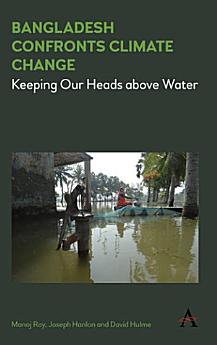Bangladesh Confronts Climate Change: Keeping Our Heads above Water
About this ebook
This densely populated country feeds itself because it is in a rich delta. But that comes at the price of a volatile environment – three huge rivers bring floodwaters from the Himalayas and massive cyclones sweep up the Bay of Bengal. Once accurately described as a ‘basket case’ of hunger and disaster, its scientists and engineers, working with local communities, have transformed the country. Strong cyclone shelters and early warning systems now protect at-risk coastal people. Improved rice varieties and irrigation feed the nation and rapidly cut child malnutrition. Women's education has curbed population growth. Along with these changes have come measures to cope with the volatile environment.
Climate change makes the problems worse, with higher temperatures and rising sea levels, heavier rain and bigger floods and stronger cyclones. Bangladeshis know what the damaged climate change will bring. The government, researchers and communities are already adapting, raising land levels to match the rise in sea level, strengthening dykes to protect against floods, producing more adaptable rice varieties and improving disaster preparation. Bangladesh is a model of climate change adaptation and a lesson for those who continue to ignore global warming.
Bangladeshis have taken a leading role in international campaigning and negotiating, helping to convince industrialized countries to curb greenhouse gas emissions. Because it cannot wait for help from rich countries, Bangladesh has shouldered most of its adaptation costs. Will industrialized countries make the task harder – or will they help Bangladesh by reducing emissions and paying for the damage already done?
About the author
Manoj Roy is a lecturer in sustainability at Lancaster Environment Centre, Lancaster University, UK.
Joseph Hanlon is a visiting senior fellow at the London School of Economics and a visiting senior research fellow at the Open University, Milton Keynes, UK.
David Hulme is a professor of development studies and executive director of the Global Development Institute, University of Manchester, UK.






